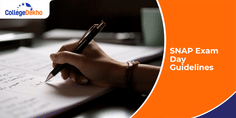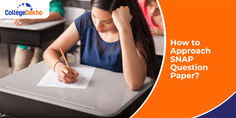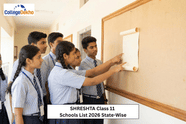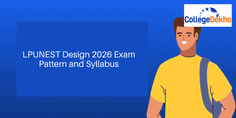GATE Computer Science & Information Technology syllabus has been released by IIT Roorkee. The GATE CS Syllabus includes 10 sections. Along with the core CS syllabus, question will also be asked from Engineering Mathematics and General Aptitude.

GATE Computer Science & Information Technology Syllabus
- IIT Roorkee has released the GATE syllabus for Computer Science & Information Technology paper. The GATE Computer Science and Information Technology syllabus includes 10 sections namely, Engineering Mathematics, Digital Logic, Computer Organization and Architecture, Programming and Data Structures, Algorithms, Theory of Computation, Compiler Design, Operating Systems, Databases, and Computer Networks. It is recommended that candidates refer to the official GATE Computer Science & Information Technology syllabus only for exam preparation. GATE CS and IT Core curriculum make up around 72% of the total marks, General Aptitude comprises 15%, and Engineering Mathematics takes 13%.
GATE Computer Science and Information Technology Exam Pattern comprised 65 questions worth a total of 100 marks. The questions will be of three types: multiple choice questions (MCQ), multiple select questions (MSQ), and numerical answer questions (NA) (NAT). The important topics on which the questions are based include Digital Logic, Algorithms, Theory of Computation, Computer Organizations, etc. Candidates who took the
GATE
exam could also choose to take the Mathematics (MA) paper as their second paper.
With over 3 lakh students taking the GATE Computer Science and Information Technology exam each year, it is important for applicants to become acquainted with the GATE CS and IT Syllabus, Subject Wise Weightage of topics, and the best books for GATE Preparation. Understanding the topic-wise and subject-wise weightage will help students prepare better and drive them toward smart work. They will be able to determine how much time and effort is required for each subject. Read more about the same as described in full in the article below.
GATE CS Exam Pattern: Highlights
The following are the highlights of the GATE Exam Pattern :
| Particulars | Details |
|---|---|
Mode | Online - Computer-Based Test (CBT) |
Duration | 3 Hours (180 Minutes) |
Nature of Questions | MCQ – Multiple Choice Questions MCQ – Multiple Select Questions NAT – Numerical Answer Type |
Number of Questions | 65 Questions |
Total Marks | 100 Marks |
Marks Awarded | 1 or 2 marks per correct answer |
Negative Marking | 1/3rd Mark will be deducted for 1 mark question; 2/3rd Mark will be deducted for 2 marks question |
Medium | English |
GATE CS and IT Subject-Wise Weightage
The following tables show the subject-wise mark weightage for GATE Syllabus -
General Aptitude
The topic-wise weightage of General Aptitude has been mentioned in the table below-
Subject | Topics | Average Weightage of Marks |
|---|---|---|
Numerical Ability | Numerical Computation | 8 |
Numerical Estimation | ||
Numerical Reasoning and DATA Interpretation | ||
Verbal Ability | English Grammar | 10 |
Sentence Completion | ||
Verbal Analogies | ||
Word Groups | ||
Instructions | ||
Critical Reasoning and Verbal Deduction |
Engineering Mathematics
Engineering Mathematics makes up 13% of the entire GATE CS and IT question paper. We have provided the subject-wise distribution of marks in this section-
1. Discrete Mathematics
Subject | Topics | Average Weightage of Marks |
|---|---|---|
Discrete Mathematics | Propositional and first-order logic | 10 |
Sets, Relations | ||
Functions | ||
Partial Orders and lattices | ||
Groups | ||
Graphs: connectivity,matching, coloring | ||
Combinators: counting,recurrence, relations, generating functions |
2. Engineering Mathematics
Subject | Topics | Average Weightage of Marks |
|---|---|---|
Engineering Mathematics | Matrices | 6 |
Determinants | ||
The system of linear equations | ||
Eigenvalues and Eigenvectors,LU decomposition | ||
Limits | ||
Continuity and differentiability | ||
Maxima and Minima | ||
Mean, Median, Mode & Standard deviation | ||
Mean value theorem | ||
Integration | ||
Conditional Probability & Bayes theorem | ||
Uniform, Normal, Exponential, Poisson and Binomial distributions |
Computer Science Subjects
The core subjects of Computer science and Information Technology constitute of the main part of the GATE CS and IT Syllabus. Given below are the topic-wise weightage distribution of the Computer Science Subjects.
1. Digital Logic
Subject | Topics | Average Weightage of Marks |
|---|---|---|
Digital Logic | Number Representation and Computer arithmetic (fixed & floating point) | 7 |
Combinational and Sequential circuits | ||
Boolean Algebra | ||
Minimization |
2. Computer Organization and Architecture
Subject | Topics | Average Weightage of Marks |
|---|---|---|
Computer Organization and Architecture | Machine instructions and addressing modes | 5 |
ALU | ||
Data-path and control unit | ||
Instruction Pipelining | ||
Memory Hierarchy:cache | ||
Main Memory | ||
Secondary Storage | ||
I/O interface( Interrupt and DMA) |
3. Programming and Data structure
Subject | Topics | Average Weightage of Marks |
|---|---|---|
Programming and Data structure | Programming C | 15 |
Recursion | ||
Boolean Algebra | ||
Arrays | ||
Stacks | ||
Linked List | ||
Queues | ||
Binary Heaps | ||
Graphs | ||
Trees | ||
Binary search trees |
4. Algorithms
Subject | Topics | Average Weightage of Marks |
|---|---|---|
Algorithms | Searching, sorting & hashing | 5 |
Asymptotic worst-case time and space complexity | ||
Algorithm design techniques: greedy, dynamic programming and divide-and-conquer | ||
Minimum spanning trees | ||
Graph search | ||
Shortest Paths |
5. Theory of Computation
Subject | Topics | Average Weightage of Marks |
|---|---|---|
Theory of Computation | Regular expressions and finite automata | 6 |
Context-free grammar and pushdown automata | ||
Regular and context-free languages | ||
Pumping Lemma | ||
Turing Machines | ||
Undecidability |
6. Compiler Design
Check the detailed topics of Compiler Design and its Average Weightage of Marks in the table below-
Subject | Topics | Average Weightage of Marks |
|---|---|---|
Compiler Design | Lexical analysis | 5 |
Parsing | ||
Syntax-directed translation | ||
Runtime Environments | ||
Intermediate code |
7. Operating Systems
Subject | Topics | Average Weightage of Marks |
|---|---|---|
Operating Systems | Processes | 8 |
Thread | ||
Inter-process communication | ||
Deadlock | ||
Concurrency and synchronization | ||
CPU Scheduling | ||
Memory management and virtual memory | ||
File systems |
8. Database
The database has a wide array of subtopics a few of which has been provided here along with the average weightage of marks-
Subject | Topics | Average Weightage of Marks |
|---|---|---|
Database | ER-Model | 9 |
Relational Model: Relational algebra, tuple, calculus, SQL | ||
Integrity constraints, normal forms | ||
File organization, indexing (e.g. B and B+ trees) | ||
Transactions and concurrency control |
9. Computer Networks
Subject | Topics | Average Weightage of Marks |
|---|---|---|
Computer Networks | Concept of Layering | 9 |
LAN technologies (Ethernet) | ||
IPv4/IPv6, routers, and routing algorithms (distance vector, link state) | ||
TCP/UDP and sockets, congestion control | ||
Application layer protocols (DNS, SMTP, POP, FTP, HTTP) | ||
Basics of WiFi | ||
Network Security: authentication, basics of public key cryptography, digital signatures and certificates, firewalls |
Also read: GATE Syllabus
GATE CS Syllabus PDF
Candidates can download the GATE syllabus PDF for Computer Science and Information Technology by clicking on the links given below.
| GATE Computer Science and Information Technology Syllabus PDF |
|---|
GATE CS and IT Best Books
Computer Science and Information Technology discipline is now the most popular among engineering students due to the booming IT sector and consistent work prospects. It is crucial that candidates follow the best books for GATE Preparation and practice materials when it comes to GATE preparation strategy to make sure they score well and improve their prospects. Here are some recommended and highly rated books for computer science GATE preparation:
GATE Preparation Books for Computer Science and Information Technology | Author |
|---|---|
Algorithms | Cormen |
Operating System | Galvin |
Theory of Computation | Ullman |
Computer Networks | Tanenbaum |
Computer Organisation | Carl Hamacher |
Database System | Korth |
Compiler Design | Aho & Ull Man |
Digital Logic | Morris Mano |
Software Engineering | Pressman |
Quick Link
About GATE
GATE exam is likely to be held on February 1, 2, 8 and 9. IIT Roorkee will soon release the GATE exam date . The GATE Exam is a nationwide exam that is taken by around 9 lakh students each year. The GATE Score has a lot of importance because all major universities that accept students use the GATE Score in their admission process, and the same is true for PSUs (Public Sector Undertakings).
The examination assesses the graduate engineer's understanding of the fundamental concepts in the field, such as discrete mathematics, digital logic, programming and data structures, compiler design, and others.
Stay Tuned to College Dekho for more such educational Content
Are you feeling lost and unsure about what career path to take after completing 12th standard?
Say goodbye to confusion and hello to a bright future!

FAQs
As per the GATE 2025 marking scheme, 1/3rd mark will be deducted for 1 mark question; 2/3rd mark will be deducted for 2 mark question.
As per the GATE 2025 Exam Pattern, there are 65 questions asked in GATE 2025 Computer Science & Information Technology.
GATE Computer Science and Information Technology 2025 comprised 100 marks.
GATE exam 2025 is likely to be held on February 1, 2, and 8, 9, 2025.
Was this article helpful?





















Similar Articles
GATE CS Question Paper Difficulty Level Trends: A detailed analysis
JEE Main 2026 Chemistry High Priority and Low Priority Chapters
Are JEE Main Study Groups Worth It? Detailed Pros and Cons for 2026 Aspirants
How to Prioritize Physics Chapters Based on JEE Main 2026 Weightage and Difficulty
GATE 2026 Mechanical Engineering Expected No. of Questions Topic-Wise
GATE 2026 Civil Engineering Expected No. of Questions Topic-Wise